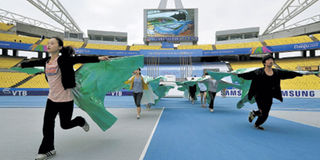Kenyans in Korea gather to cheer team

South Korean dancers take part in the rehearsal for the opening ceremony at Daegu Stadium of the World Athletics Championships. The International Association of Athletics Federations (IAAF) World Championships begin on Saturday and run through September 4. Photo/AFP
Kenyans living in South Korea and next door will troop into Daegu over the next few hours ready to shout themselves hoarse for the country.
They will be arriving in time for Saturday's opening ceremony of the 13th IAAF World Championships in Athletics.
Benson Kamary, the spokesman of the Kenyan Community in Korea (KCK), yesterday confirmed he had been in touch with his patriotic compatriots who are all set for the August 27 to September 4 competition.
“Kenyans here have been upbeat ahead of the Daegu championships since last year,” Kamary said.
“You may remember that Daegu City was picked to host these championships during the 2007 IAAF World Cross Country Championships in Mombasa and Kenyans here started talking about it since then.”
Kamary, a Daystar University alumnus, said KCK formed a special committee to work on publicity, transportation, ticketing and related logistics.
“With the support of the Kenyan embassy here, it’s all systems go now,” he added.
The Kenyan mission in Seoul is headed by ambassador Ngovi Kitau who arrived from an official trip in Nairobi, in time for the start of the global track and field championships on Saturday.
Currently, there are about 200 known Kenyans living in South Korea, 80 per cent of them students.
The rest are businessmen, religious workers with a few married into South Korean families.
It is unknown if there are any Kenyans in North Korea, with the secretive Pyongyang administration of Kim Jong-Il ill at ease with foreigners.
Kenya doesn’t have diplomatic contact with North Korea, but Tanzania, thanks to the communist-socialist policies of founding father, Julius Nyerere, maintains a mission in Pyongyang.
“We have 1,000 mini flags for Kenyans and friends of Kenyans to use in support of our team and we will wear Kenyan T-shirts and any other patriotic attire,” Kamary said.
“Kenyans in Seoul and its environs are hiring a bus to travel to Daegu, while those in Busan, like myself, will take a train or bus.”
Besides Kamary, the organizing committee of the Kenyan fans club here also has Patrick Ntonja (chairman), Brian Sambu and Mark Rotich.
Kenyan athletes are very popular in South Korea, especially after the 1992 Seoul Olympics and the 2008 Games in the nearby Beijing City.
“Kenyans are very popular and, in fact, most times when you tell the people here that you are from Kenya, they will say ‘Wow! That marathon country’ and they will ask if you can also run.”
In 2008, Kenyans swept the podium at the Seoul Marathon with Sammy Korir winning the annual race in two hours, seven minutes and 32 seconds followed by Jason Mbote (2:07.37) and Edwin Komen (2:07.45).
“It is difficult to mobilise all the Kenyans here because we live in different places,” Ntonja said, adding: “I’m happy that so far, 50 have confirmed they will travel to Daegu to cheer the team.” The KCK chairman lives some 40 minutes drive from the capital, Seoul.
The Kenyan embassy here has not left anything to chance, and has organised some of its staff to be with the Kenyan delegation throughout the championships.



